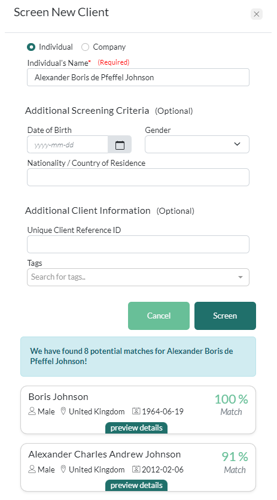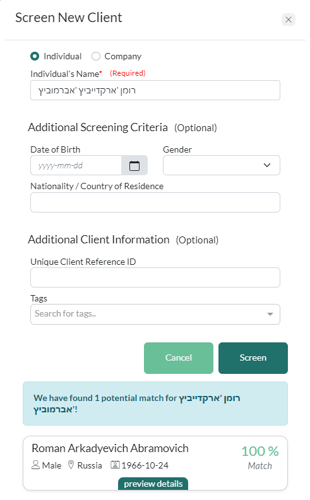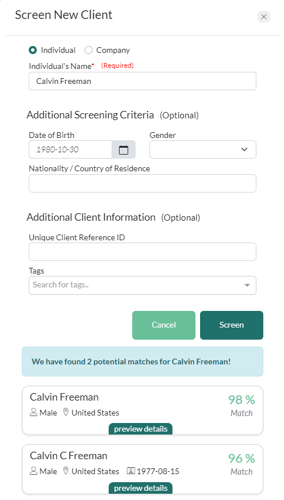15 August 2023
Why do elevators always seem to be waiting on the right floor? Is it sheer coincidence? Maybe they have a mind of their own. The answer is in part the latter; the traffic mode of an elevator system is programmed according to the number and frequency of passengers arriving and departing in a building lobby. As a result, the elevator waits in the lobby during busier times in anticipation of traffic. This is known as fuzzy logic; a technique to embody human-like thinking into a control system. Significantly, fuzzy logic is also employed by AML screening and monitoring systems to optimise the number of alerts you receive on any given company or individual.
The recognition of aliases in AML screening and monitoring systems is just one example of the way they use fuzzy logic to optimise alerts. Figure 1 shows that a search for ‘Alexander Boris de Pfeffel Johnson’ on Themis Search brings up a result for Boris Johnson, the former Prime Minister, rather than exclusively bringing up results for individuals named Alexander Johnson. This is attributable to the system’s use of fuzzy logic, which enables it to recognise that Boris Johnson’s full name is in fact Alexander Boris de Pfeffel Johnson. In addition, the system’s use of fuzzy logic also means that name variations are factored into a search; figure 2 highlights how a search for ‘Arif Mohammad Khan’ brings up a corresponding result as well as results for a Arif Mohammed Khan and a Mohammad Arif Khan. This helps ensure that the user does not miss potential true positives due to a variation in the spelling of one’s name. According to one industry expert, the application of fuzzy logic here has proven transformative in terms of efficiency gains as one no longer needs to conduct a number of different searches to account for name variations.
Figure 1: Alexander Boris de Pfeffel Johnson Figure 2: Arif Mohammad Khan


Moreover, Themis Search’s use of fuzzy logic allows you to search for names in different languages. Figure 3 shows that a search for ‘רומן 'ארקדייביץ 'אברמוביץ’, which is Hebrew for ‘Roman Abramovich’, brings up a profile for Roman Abramovich in English. This is vital as it ensures that language does not act as a barrier when trying to identify a match. In addition, fuzzy logic is also applied when searching using a date of birth.
Figure 4 highlights how the system shows the results for two people with the same name despite having different dates of birth. This is because the system deliberately returns results which are plus/minus three years from the date the user has searched for in order to account for potential inaccuracies in the user’s data; this increases the scope of the search and increases the likelihood of identifying a positive result.
Figure 3: Roman Abramovich Figure 4: Calvin Freeman


The use of fuzzy logic to optimise alerts is of great importance as AML professionals are increasingly reporting that they are being swamped with an excessive number of alerts; two thirds of respondents to Themis’ recent Financial Crime Technology Survey described this as their biggest pain point with their current AML screening and monitoring system. This is also problematic for organisations as it means that their compliance analysts are spending most of their time reviewing alerts. As a result, organisations risk losing sight of the purpose of screening - to detect suspicious activity related to financial crime - as it becomes more of an exercise in process management. This is also something that the Financial Conduct Authority (FCA) has drawn attention to; they note that an excessive number of alerts on screening and monitoring systems is an example of poor practice as it leads to ‘large numbers of resource intensive false positives’. While one may suggest narrowing the scope of the search to address this issue, this will likely lead to false negatives, with the user mistakenly believing that there are no positive results. This too is regarded as an example of poor practice, with the FCA discouraging the ‘discounting [of] actual target matches incorrectly as false positives due to insufficient investigation’. This dilemma poses a pertinent question: where does this leave the user?
The solution is for users of AML screening and monitoring systems to use a tool which empowers them with control over the fuzziness setting and, by extension, their alerts. Themis Search, our end-to-end financial crime screening platform that allows you to investigate any company or individual in the world for links to financial crime, does exactly this. In addition to factoring in different bits of information like aliases and languages, it also allows the user to adjust date of birth sensitivity, meaning that the user can search for anything between exact matches to those 5 years within the date of birth. The user can also tune the fuzzy logic searching thresholds across the system. Set it to 100% and the system will only return matches if it believes there is an exact match with your data or set it down to 65% to maximise the range of potential matches you will be able to find. These features were heralded by an industry expert during a research interview for this article, who noted that they can have a transformative effect by increasing both job satisfaction and productivity while also helping to reduce operating costs. Significantly, we are continuing to build upon and develop our fuzzy logic as we look to provide users with the ability to control even more variables when refining a search in the near future.
If you are interested in booking a demo of our platform, please do so here.
By Aria Poshteh, Insight and Customer Success, Themis